Washington George

George Washington (February 22, 1732 [O.S. February 11, 1731][1][2][3]– December 14, 1799) was the commander of the Continental Army in the American Revolutionary War (1775–1783) and served as the first President of the United States of America (1789–1797).[4] For his central role in the formation of the United States, he is often referred to as the father of his country.[5][6] The Continental Congress appointed Washington commander-in-chief of the American revolutionary forces in 1775. The following year, he forced the British out of Boston, lost New York City, and crossed the Delaware River in New Jersey, defeating the surprised enemy units later that year. As a result of his strategy, Revolutionary forces captured the two main British combat armies at Saratoga and Yorktown. Negotiating with Congress, the colonial states, and French allies, he held together a tenuous army and a fragile nation amid the threats of disintegration and failure. Following the end of the war in 1783, King George III asked what Washington would do next and was told of rumors that he'd return to his farm; this prompted the king to state, "If he does that, he will be the greatest man in the world." Washington did return to private life and retired to his plantation at Mount Vernon.[7] He presided over the Philadelphia Convention that drafted the United States Constitution in 1787 because of general dissatisfaction with the Articles of Confederation. Washington became President of the United States in 1789 and established many of the customs and usages of the new government's executive department. He sought to create a nation capable of surviving in a world torn asunder by war between Britain and France. His unilateral Proclamation of Neutrality of 1793 provided a basis for avoiding any involvement in foreign conflicts. He supported plans to build a strong central government by funding the national debt, implementing an effective tax system, and creating a national bank. Washington avoided the temptation of war and a decade of peace with Britain began with the Jay Treaty in 1795; he used his prestige to get it ratified over intense opposition from the Jeffersonians. Although never officially joining the Federalist Party, he supported its programs and was its inspirational leader. Washington's farewell address was a primer on republican virtue and a stern warning against partisanship, sectionalism, and involvement in foreign wars. Washington was awarded the very first Congressional Gold Medal with the Thanks of Congress.[8] Washington died in 1799, and the funeral oration delivered by Henry Lee stated that of all Americans, he was "first in war, first in peace, and first in the hearts of his countrymen".[9] Washington has been consistently ranked by scholars as one of the greatest U.S. Presidents. George Washington was born on February 22, 1732 [O.S. February 11, 1731][1][2][3] the first child of Augustine Washington and his second wife, Mary Ball Washington, on their Pope's Creek Estate near present-day Colonial Beach in Westmoreland County, Virginia. His father had four children by his first wife, Jane Butler: two died young, but two sons survived (Lawrence, born circa 1718, and Augustine, born circa 1720), making George the third son, but very much younger. Moving to Ferry Farm in Stafford County at age six, George was educated in the home by his father and eldest brother.[10] The growth of tobacco as a commodity in Virginia could be measured by the number of slaves imported to cultivate it. When Washington was born, the population of the colony was 50 percent black, mostly enslaved Africans and African Americans.[11] In his youth, Washington worked as a surveyor, and acquired what would become invaluable knowledge of the terrain around his native Colony of Virginia.[12] His eldest brother's marriage into the powerful Fairfax family gained young George the patronage of Thomas Fairfax, 6th Lord Fairfax of Cameron, the Proprietor of the Northern Neck, which encompassed some five million acres. In late July 1749, immediately following the establishment of the town of Alexandria, Virginia along the Potomac River, 17-year old George was commissioned as the first Surveyor of the newly created Culpeper County, Virginia in the interior of the colony. This appointment was undoubtedly secured at the behest of Lord Fairfax and his cousin (and resident land agent) William Fairfax of Belvoir, who sat on the Governor's Council.[13] Washington embarked upon a career as a planter, which historians defined as those who held 20 or more slaves. In 1748 he was invited to help survey Lord Fairfax's lands west of the Blue Ridge. In 1749, he was appointed to his first public office, surveyor of newly created Culpeper County.[10][14] Through his half-brother, Lawrence Washington, he became interested in the Ohio Company, which aimed to exploit Western lands. In 1751, George and his half-brother traveled to Barbados, staying at Bush Hill House,[15] hoping for an improvement in Lawrence's tuberculosis. This was the only time George Washington traveled outside what is now the United States.[16] After Lawrence's death in 1752, George inherited part of his estate and took over some of Lawrence's duties as adjutant of the colony.[17] In late 1752, Virginia's newly arrived Governor, Robert Dinwiddie, divided command of the militia into four regions and George applied for one of the commands, his only qualifications being his zeal and being the younger brother of the former adjutant. Washington was appointed a district adjutant general in the Virginia militia in 1752,[10] which appointed him Major Washington at the age of 20. He was charged with training the militia in the quarter assigned to him.[18] At age 21, in Fredericksburg, Washington became a Master Mason in the organization of Freemasons, a fraternal organization that was a lifelong influence.[19][20] In December 1753, Washington was asked by Governor Robert Dinwiddie of Virginia to carry a British ultimatum to the French Canadians on the Ohio frontier.[10] Washington assessed French military strength and intentions, and delivered the message to the French Canadians at Fort Le Boeuf in present day Waterford, Pennsylvania. The message, which went unheeded, called for the French Canadians to abandon their development of the Ohio country. The two colonial powers were heading toward worldwide conflict. Washington's report on the affair was widely read on both sides of the Atlantic. In 1754, Dinwiddie commissioned Washington a Lieutenant Colonel and ordered him to lead an expedition to Fort Duquesne to drive out the French Canadians.[10] With his American Indian allies led by Tanacharison, Washington and his troops ambushed a French Canadian scouting party of some 30 men, led by Joseph Coulon de Jumonville.[21] Washington and his troops were overwhelmed at Fort Necessity by a larger and better positioned French Canadian and Indian force, in what was Washington's only military surrender. The terms of surrender included a statement that Washington had assassinated Jumonville after the ambush. Washington could not read French, and, unaware of what it said, signed his name.[22] Released by the French Canadians, Washington returned to Virginia, where he was cleared of blame for the defeat, but resigned because he did not like the new arrangement of the Virginia Militia.[22] In 1755, Washington was an aide to British General Edward Braddock on the ill-fated Monongahela expedition.[10] This was a major effort to retake the Ohio Country. While Braddock was killed and the expedition ended in disaster, Washington distinguished himself as the Hero of the Monongahela.[23] While Washington's role during the battle has been debated, biographer Joseph Ellis asserts that Washington rode back and forth across the battlefield, rallying the remnant of the British and Virginian forces to a retreat.[24] Subsequent to this action, Washington was given a difficult frontier command in the Virginia mountains, and was rewarded by being promoted to colonel and named commander of all Virginia forces.[10] In 1758, Washington participated as a Brigadier General in the Forbes expedition that prompted French evacuation of Fort Duquesne, and British establishment of Pittsburgh.[10] Later that year, Washington resigned from active military service and spent the next sixteen years as a Virginia planter and politician.[25] As a colonial militia officer, albeit a high ranking one, Washington was acutely conscious of the disparity between officers in the militia and those in the British Army (the Regulars). His eldest brother Lawrence had been fortunate to be awarded a Commission in the Regulars, as "Captain in a Regiment of Foot", in summer 1740, when the British Army raised a new Regiment (the 61st Foot, known as Gooch's American Regiment) in the Colonies, for service in the West Indies during the War of Jenkins' Ear.[26][27] Each colony was allowed to appoint its own Company officers—the Captains and Lieutenants—and signed Commissions were distributed by Colonel William Blakeney to the various governors.[28] Fifteen years later, when General Braddock arrived in Virginia in 1755 with two regiments of Regulars (the 44th and 48th Foot), Washington sought to obtain a Commission, but none were available for purchase.[29] Rather than serve as a militia lieutenant colonel, where he would be outranked by more junior officers in the Regulars, Washington chose to serve in a private capacity as aide-de-camp to the General: as an aide he could command British Regulars.[30] Following Braddock's defeat, the British Parliament decided in November 1755 to create a new Royal American Regiment of Foot—later renamed King's Royal Rifle Corps -- but, unlike the earlier "American Regiment" of 1740–42, all of the officers were recruited in England and Europe in early 1756. On January 6, 1759, Washington married the widow Martha Dandridge Custis. Surviving letters suggest that he may have been in love at the time with Sally Fairfax, the wife of a friend. Some historians believe George and Martha were distantly related. Nevertheless, George and Martha made a good marriage, and together raised her two children from her previous marriage, John Parke Custis and Martha Parke Custis, affectionately called "Jackie" and "Patsy" by the family. Later the Washingtons raised two of Mrs. Washington's grandchildren, Eleanor Parke Custis and George Washington Parke Custis. George and Martha never had any children together—his earlier bout with smallpox followed, possibly, by tuberculosis may have made him sterile. The newlywed couple moved to Mount Vernon, where he took up the life of a planter and political figure.[31]
do you like this author?
What readers are saying
What do you think? Write your own comment on this book!
write a commentWhat readers are saying
What do you think? Write your own comment on this author!
write a commentBook list

Washington's Masonic CorrespondenceAs Found among the Washington Papers in the Library of Congress
Series:
Unknown
Year:
Unknown
Raiting:
3.5/5
Show more
add to favoritesadd In favorites

rules of conduct diary of adventure letters and farewell addresses
Series:
Unknown
Year:
Unknown
Raiting:
2.5/5
Show more
add to favoritesadd In favorites

reprint of the original letters from washington to joseph reed during the ameri
Series:
Unknown
Year:
Unknown
Raiting:
5/5
Show more
add to favoritesadd In favorites
Book list

Washington's Masonic CorrespondenceAs Found among the Washington Papers in the Library of Congress
Series:
Unknown
Year:
Unknown
Raiting:
3.5/5
Show more
add to favoritesadd In favorites

rules of conduct diary of adventure letters and farewell addresses
Series:
Unknown
Year:
Unknown
Raiting:
2.5/5
Show more
add to favoritesadd In favorites

reprint of the original letters from washington to joseph reed during the ameri
Series:
Unknown
Year:
Unknown
Raiting:
5/5
Show more
add to favoritesadd In favorites

public record of perry belmont a member of the house of reprsentatives in the 4
Series:
Unknown
Year:
Unknown
Raiting:
3.5/5
Show more
add to favoritesadd In favorites

official letters to the honorable american congress written during the war bet
Series:
Unknown
Year:
Unknown
Raiting:
3/5
Show more
add to favoritesadd In favorites

official letters to the honorable american congress written during the war b
Series:
Unknown
Year:
Unknown
Raiting:
4/5
Show more
add to favoritesadd In favorites

official letters to the honorable american congress volume 1
Series:
Unknown
Year:
Unknown
Raiting:
3/5
Show more
add to favoritesadd In favorites

letters and recollections of george washington being letters to tobias lear and
Series:
Unknown
Year:
Unknown
Raiting:
2.5/5
Show more
add to favoritesadd In favorites

last will and testament of george washington of mount vernon the only authent
Series:
Unknown
Year:
Unknown
Raiting:
5/5
Show more
add to favoritesadd In favorites
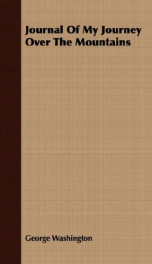
journal of my journey over the mountains
Series:
Unknown
Year:
Unknown
Raiting:
5/5
JOURNAL OF MY Journey Over the Mountains GEORGE WASHINGTON, WHILE SURVEYING FOR LORD THOMAS FAIRFAX, BARON OF CAMERON, IN THE NORTHERN NECK OF VIRGINIA, BEYOND THE BLUE RIDGE, pied from fhr Original with Literal Exactness and Edited with Notes BY J. M. TONER, M. D. ALBANY, - 1892 - TABLE OF ILLUSTRATIONS. I. Mount Vernon farms, to face page.. ....... 2. Mount Vernon hills - made as early as I 747, traced from original, to face page.. ..... 3. Plan of Major Lawrence Washingtons tur- nip field, traced from original, to face page ................................ 4. Plan of survey of land known as Hell Hole, traced from original, to face page. ...... 5. Mount Vernon river front at mouth of Hunt- ing creek, traced from original, to face page .............................. 6. Surveyiilg or measuring land, a study traced from original, to face page. ............ 7. Lost river, traced from the original, to face page ......... .................. 8. Plat of Francis Jetts land, traced from the original, to face page ................. g. Plat of Elizabeth Washingtons land, traced from the original, to face page.. ....... 10. Plat of survey for Richard Barnes, Gent., copied from Sparks, to face page.. ...... PREFACE. Washingtons Journal here given to the public, if we except his version of the Rules of Civility and Decent .Behaviour in Company and Conversation, is the earliest literary effort of this, the most admira- ble character in all history. The editor has long been engaged in collecting accurate copies of all the obtainable writings of this great man. Wherever it has been found practicable to examine and critically compare even his generally accepted writings with the originals, it has been, or will be done to secure a copy of exact and verified conformity, in every par- ticular, with the text as it left the hand of the writer. It is a well-known fact that editors have taken great liberties with Washingtons writings, not for the purpose of falsifying history, or aspersing his character, but from a variety of reasons, often to sup- press caustic expressions, or to substitute a more euphonious word to give to his sentences a fine, rhe- torical finish. Such editorial dressing, even where the motive is well intended, is vicious in principle and liable to abuse and, in the case of Washingtons writings, is neither justifiable nor desirable. The time has come when the people want to know inti- mately and without glamour or false coloring, the father of his country as he actually lived and labored, 6 Preface, and to possess his vritings, just as he left them, on every subject which engaged his attention. It is the purpose of the editor to prepare a complete collection of all the writings of George Vashington, from his youth to the close of his eventful life, with that literal exactness as to test ivlich can only be assured by the careful efforts of an esperienced copyist and espert proof reader having access to and comparing in every possible case the co1ies with the originals. This initial Diary of IVashington opens nit11 his six- teenth year, and plainly shows the energy and the maturity of his judgment, and his capability to dis- charge even then important trusts with efficiency. Forthcoming volumes will give, in clronological order, his co-operation in the march of events on this continent, and his life and opinions as seen through the writings he left. This volume must be viewed as the work of a youth, making a few, brief and hurried memoranda while in the depths of the forest and in- tended for 110 eye but his own. The time is not far distant when an edition of Vashingtons more im- portant papers will be called for in facsimile by some one of the photogravure processes now available for such purposes, because of the unquestionable ficlclity to the original it secures and which is approximately arrived at in this publication...
Show more
add to favoritesadd In favorites
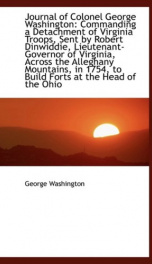
journal of colonel george washington commanding a detachment of virginia troops
Series:
Unknown
Year:
Unknown
Raiting:
4/5
Sent By Robert Dinwiddie, Lieutenant-Governor Of Virginia, Across The Allegheny Mountains In 1754 To Build Forts At The Head Of The Ohio. Edited With Notes.
Show more
add to favoritesadd In favorites
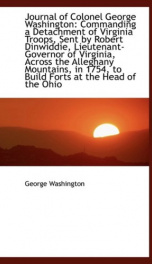
journal of colonel george washington
Series:
Unknown
Year:
Unknown
Raiting:
4.5/5
Sent By Robert Dinwiddie, Lieutenant-Governor Of Virginia, Across The Allegheny Mountains In 1754 To Build Forts At The Head Of The Ohio. Edited With Notes.
Show more
add to favoritesadd In favorites
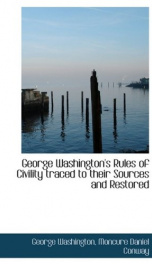
george washingtons rules of civility traced to their sources and restored
Series:
Unknown
Year:
Unknown
Raiting:
3/5
Show more
add to favoritesadd In favorites

fifty five letters of george washington to benjamin lincoln 1777 1799 briefly
Series:
Unknown
Year:
Unknown
Raiting:
4.5/5
Show more
add to favoritesadd In favorites

farewell address websters bunker hill oration
Series:
Unknown
Year:
Unknown
Raiting:
4.5/5
Show more
add to favoritesadd In favorites
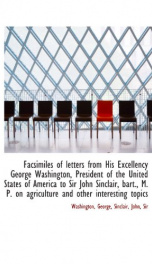
facsimiles of letters from his excellency george washington president of the un
Series:
Unknown
Year:
Unknown
Raiting:
3.5/5
A VARIETY of motives, which it may bc propcr briefly to state, have induced me to subrnit the foHotv-i igL ctterv to the attc tio o n f the public. It could not t ut be highly gratifying to me, to be possessed of so many ir tcrcstirig comnrunicntions fiom sucll n distinguished charnctcr as the President of the United States and it was natural to suppose, that the public at large, but more especially thoec individuals rvllo rcvcred his memory, ivonld wish to have in tllcir posscsaiol cohies of a correspondcncc wbich displayed to such advantage the superior talents, the generous vicws, and the urlbounded pl ilanthropyo itliat cclcbrated stutcsruan. The peculiar predilection wliich General WASHISGT 11 U as N s o stro lglya nd so frcqucn tly cxprcsacd, iri the subsequent letters, for agricultural improvement, wl1ic11 he preferred to every other pursuit, is another circurnstnncc which I was anxious should bc rccordcd for the bcncfit both of the present and of future times, from a desire that it maj-nlakc a duc impression upon the r inilosf those who miglit otl erlvisc be it rluccd to dcdicatc tllc l sclve e s n tirely, either to ttlc pllarltoil s of military fame, or the tortures of political ambition. The praises wliich this distitiguishcd etatcsmnn has bestowed on the establislimcnt of the Ilrjtish Boatd of hgriculture, an Institution, 11c remarks, of the utilitx of rtilicl h c entertained the most hvomablc idea from the first intimation of it and that thc morc llc had scen and reflected on tlic plan since, the nlorc conrinced he was of its importance, in a national point of view, not only to Grcat 13ritair1, but to all other co mtrics, L was solicitous to record, l3 011 rn cans of protecting thnt valuable establishment from the risk to rthich it may he csposed from tbe ignorance or inattention of future ministers, who, incapnblc of estimating thc mcrits of such an Institution tl cmselvcs, o r concciring the advantages that may bc dcrivcd from it, might hccdlesslp, eithcr diminid tim sphere of its utility, or terminate its clistcnce. The wisllcs which the foundcr of thc hmcrican Republic has expressed for bavi ig a similar cstablishmcnt in America, I also judged it, erpcrlicnt to publish, in thc lope that the recommendation of so great a Inan mill ultimately be arloptcd a eoon as the necessary arrangcrnents Ibr that purpose can bc mndc by the government of the United Sl tes. It may now bc propcr to give a brief account of the origin of the following correspondcncu. About thc ycnr 1790, I began to bc cngaged in those eltensive inquilics relating to the general etate of my natiuc coarltry, and the rrlcans of promoting its improvement, which W-ere not on rntcresting to Grcat Britain, lmt to cvcry civiIized part of tlie world and ha ing re solvcd to send the first papers vhich w ere See 1, cttcr KO. III., l0lh July, 1795...
Show more
add to favoritesadd In favorites

diary of washington from the first day of october 1789 to the tenth day of ma
Series:
Unknown
Year:
Unknown
Raiting:
4.5/5
Show more
add to favoritesadd In favorites
What readers are saying
What do you think? Write your own comment on this author!
write a commentGenre
- Books / History / Americas
- Literature & Fiction / Literary
- Books / Children's Books
- Nonfiction / Politics / General
- Literature & Fiction / Genre Fiction / Historical
- Law / United States
- Nonfiction / Education / Education Theory / History
- Books / Conservation of natural resources / United States / Congresses
- Reference / Atlases & Maps / World
if you like Washington George try:
readers also enjoyed
What readers are saying
What do you think? Write your own comment on this author!
write a commentGenre
- Books / History / Americas
- Literature & Fiction / Literary
- Books / Children's Books
- Nonfiction / Politics / General
- Literature & Fiction / Genre Fiction / Historical
- Law / United States
- Nonfiction / Education / Education Theory / History
- Books / Conservation of natural resources / United States / Congresses
- Reference / Atlases & Maps / World
if you like Washington George try:
readers also enjoyed
Do you want to exchange books? It’s EASY!
Get registered and find other users who want to give their favourite books to good hands!

